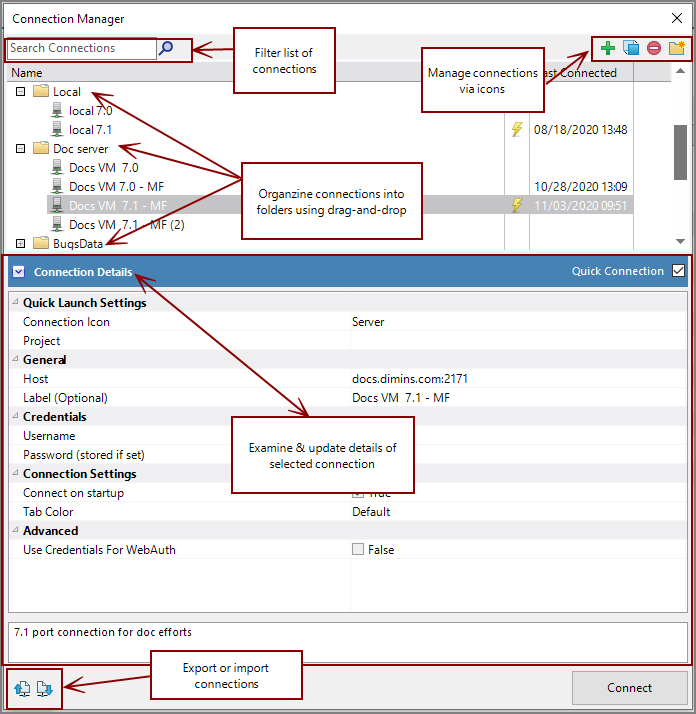The Diver Solution and Diver Platform are client/server systems. Workbench projects are stored on the DiveLine server. The Workbench client needs to connect to the DiveLine server to work with the project files.
Workbench connections to the DiveLine servers are created and managed with the Connection Manager (File > Open Connection).


Some general consideration about connections:
- Each connection is to a specific DiveLine server and port, or to a DiveTab URL.
- You can create multiple connection profiles and organize them into folders.
- You can create a set of buttons for quick access to your most frequently used sites.
- You can export all your connections to an encrypted file and import to a new Workbench instance on a new device.
Some considerations about DiveLine server connections:
- One physical server may host several DiveLine connections, each on its own port.
- Each DiveLine server connection is not necessarily a specific hardware server, as these connections can be to virtual machines.
- Each DiveLine server connection can contain multiple projects.
Some considerations about DiveTab server connections:
- The DiveTab URL is to a DivePort instance created specifically for the DiveTab iPad app (or DiveTab-PC) to retrieve the data presentation.
- A DiveTab connection is required in order to configure a DiveTab via a DivePort instance (that is, point to the top level DiveTab script in the project).
- The DiveTab project itself is stored in a Workbench project structure in the same manner as the DiveLine projects.
- One server may host several DiveTab projects, each with its own DivePort instance.
- If a DiveTab connection fails to open, try a simple DiveLine connection from Workbench. This will help with trouble shooting firewall, port, or DNS issues which may be preventing a successful connection.
- Workbench needs a DiveLine connection to function—if you have a DiveTab connection in Workbench, it connects to DivePort (the URL specified for DiveTab). The first request is to ask DivePort for its DiveLine information. Workbench then connects to the server and port which is returned. The DiveLine server for a DivePort instance is defined in its context xml file. If the context file includes a diveline.server.external parameter, that is returned to Workbench, rather than the diveline.server. This ensures Workbench connects to the correct server name and port.
NOTE: Connection Manager is used to manage all connections, including any connections to your local machine that you may set up. See Server Settings Overview for information about managing various aspects of your DiveLine connection.
Mentioned in: